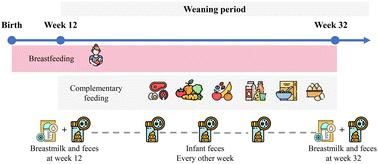辅食对婴儿肠道微生物组、代谢物和早期发育的影响。
摘要
添加辅食对促进婴儿健康和发育至关重要。在断奶期间,膳食模式可提供必需的营养素,并促进多样化肠道微生物群的发展,而肠道微生物群在调节免疫、代谢和神经功能方面发挥着重要作用。这项研究招募了 200 个家庭,以评估辅食对婴儿生长和健康结果的影响。数据包括喂养方式的详细记录、婴儿生长测量、健康评估以及产后第 12 周至第 32 周收集的粪便样本和母乳。利用 16S rRNA 测序分析了肠道微生物组,并利用色谱-质谱法测量了母乳低聚糖(HMO)、单糖和短链脂肪酸(SCFA)等代谢物。结果显示,母乳喂养的比例很高,16 周左右开始添加辅食。婴儿肠道微生物群发生了显著变化,尤其是乳酸杆菌属、阿克曼菌属和葡萄球菌属。此外,还发现 HMOs、单糖和 SCFAs 的含量受添加辅食的影响。辅食喂养方式、肠道微生物组多样性、特定细菌属(如链球菌、乳酸杆菌、双歧杆菌和梭状芽孢杆菌)和关键代谢物(如乳-N-四糖、乳-N-新四糖、甘露糖和丁酸)之间存在显著的相关性。这项研究为了解婴儿早期生长过程中辅食喂养、肠道微生物组发育和代谢物之间复杂的相互作用提供了宝贵的见解。建议今后开展更大规模的队列研究和有针对性的饮食干预,以进一步阐明其潜在机制。
本文章由计算机程序翻译,如有差异,请以英文原文为准。

Impact of complementary feeding on infant gut microbiome, metabolites and early development†
Introducing complementary foods is critical for promoting infant health and development. During the weaning period, the dietary patterns provide essential nutrients and facilitate the development of a diverse gut microbiome, which plays significant roles in the regulation of immune, metabolic, and neurological functions. This study enrolled 200 families to assess the impact of complementary feeding on infant growth and health outcomes. Data included detailed records of feeding practices, infant growth measurements, health assessments, and fecal samples and breast milk collected between weeks 12 and 32 postpartum. The gut microbiome was analyzed using 16S rRNA sequencing, while metabolites such as human milk oligosaccharides (HMOs), monosaccharides, and short-chain fatty acids (SCFAs) were measured using chromatography-mass spectrometry. Results revealed a high prevalence of breastfeeding, with complementary food introduced at around 16 weeks. Significant alterations in the infant gut microbiome were observed, particularly in the genera Lactobacillus, Akkermansia, and Staphylococcus. Additionally, the levels of HMOs, monosaccharides, and SCFAs were found to be influenced by the introduction of complementary foods. Significant correlations emerged between complementary feeding practices, gut microbiome diversity, specific bacterial genera (e.g., Streptococcus, Lactobacillus, Bifidobacterium, and Clostridioides), and key metabolites (such as lacto-N-tetraose, lacto-N-neotetraose, mannose, and butyric acid). This study offers valuable insights into the complex interactions between complementary feeding, gut microbiome development, and metabolite profiles during early infant growth. Future research with larger cohorts and targeted dietary interventions is recommended to further elucidate the underlying mechanisms.
相关知识
Science:HMOs或可塑造早期早产儿肠道微生物组
生命早期肠道微生物组和疫苗功效
生命早期营养不良和微生物群影响大脑发育和行为
肠道3M:微生物组、代谢和代谢组,从基础走向未来
肠道微生物组对卵巢衰老的影响
母亲肠道菌群和饮食习惯对新生儿生长发育的影响
“菌”浓于水,母体微生物如何影响胎儿免疫发育?
Nature|父系肠道微生物影响后代健康
瘦身饮食对肠道微生物影响
微生物群在婴儿健康中的作用:从早期到成年
网址: 辅食对婴儿肠道微生物组、代谢物和早期发育的影响。 https://m.trfsz.com/newsview1377567.html